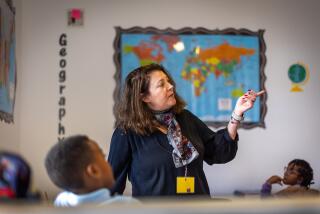Learning on Company Time : Education: A Moorpark firm offers employees the unique benefit of an on-site school for their children.
- Share via
MOORPARK — Busy making sales calls most of the morning, Anne Zibalese--a sometimes-harried working mother--realizes amid all her office work that it’s been a while since she has seen her son David, 13, and daughter Ashley, 11.
Not to worry. She just gets up from her cluttered desk, walks to the back of the sales room, opens the door and peeks in. Inside, her children are busy doing schoolwork with their classmates.
Nestled behind her sales office at G.T. Water Products--and next to the company’s assembly line--is a school like almost no other in the nation: a few rooms where a dozen students from the age of 4 to 16 are learning together in the same building where their parents work.
The private, accredited school opened in 1987 at G.T., a company in Moorpark’s warehouse district that makes and markets such items as heavy-duty plungers and industrial plumbing devices.
The company is, according to Working Mother magazine, the only business in America operating primary and secondary schools for its employees’ children.
The school was started by company President George Tash primarily to benefit his own young children. His daughter Jennifer, now 18, was bored at her private school and dreaded getting up for class every day.
Tash, remembering his own dread of school, looked for a unique approach to inspire learning and keep Jennifer and her younger brother, Adam, now 15, nearby.
He started the school and it became something more than a place to send his children; it became a major selling point as the firm tried to attract and retain employees.
“One of the main reasons I chose this job was because of this benefit,” said receptionist Jennifer Tomlinson , whose 4-year-old son, Anthony, attends the school. “It can be so hard leaving your children with someone else every day.”
It is a benefit that has transformed the company in subtle and profound ways. Alongside the dozens of patents mounted on plaques and hanging in the front lobby are seven framed covers of Working Mother magazine--one from each year that the company has landed on the magazine’s list of the 100 best companies in the country for working women.
Children’s art dots the walls in offices throughout the company, and poems are pasted up next to the filing cabinets.
The students work together in the equivalent of a one-room schoolhouse run by teacher Brian Kearsey. Kearsey takes a free-flowing, Montessori-inspired approach to education--letting the students develop at their own pace.
He schedules some studies so that no academic areas are ignored, but the children generally decide what to learn and when. The afternoons are often reserved for special field trips to the John Paul Getty Museum or nearby parks.
Although the students seem to love the self-paced, intimate learning environment, they know that they miss out on what students at larger schools take for granted: There is no homecoming, no junior or senior prom, and very few other children to socialize with.
Tash’s son Adam said he considered enrolling in a larger public or private school because he felt that he was missing out on the fundamentals of teen-age culture. “I almost left for a social life,” he said.
But since that period of doubt, the school has started group activities with another private school that has students Adam’s age.
*
“Having a school in a corporate setting allows students and their parents to check in with each other throughout the day,” said Stephen Brown, 16, who has attended the school for four years. For the last two years, he also has taken classes at Moorpark College, and in the spring he plans to enter UCLA’s School of Engineering with enough credits to be a college junior.
“Parents are supposed to raise their kids with their ethics and beliefs,” he said. “In today’s world--with both parents working--that’s not really possible. Parents end up turning all that over to the schools, but (at G.T.) the parents are part of every day of learning.”
The values that the children pick up are not just from their parents but also from the workaday world.
Every day, the students are exposed to the business that keeps the small but successful company afloat: They have to walk past the assembly line to get to the lunch truck parked behind the factory at noon; they know that lucrative business deals might be spoiled if they dash into a room without knocking; they have learned how to behave around clients.
Along with their reading, writing and arithmetic, a few have picked up a little business acumen.
Anne Zibalese’s son David can easily rattle off the company’s product line. “There’s the Royal Flusher, the Master Plunger, the Mini-Master 3 and the Drain King,” he said, naming some of the flashier products.
David and Adam Tash have taken to selling the products at swap meets and trade shows. They have their own sales pitch and can explain the inner workings of the devices.
“The Drain King expands and creates an air lock,” Adam, 15, said, while taking a break from class. “Then it clears the clog through a pulse that is created by hydraulics. But I can’t really go into that, it’s a trade secret.”
The company spends about $50,000 a year on school supplies and Kearsey’s salary, and there is no charge to employees with children enrolled. School Director Resa Brown donates her time in exchange for free education for her three children.
It is money well spent by the company, employees say--even those who don’t have children.
Rhonda Dinivus, who works in the shipping department, said she likes to stop by the school to visit during the day. The children all know her and on her birthday brought her candy.
And best of all, she said, “on my break I can come by if I need a hug.”
More to Read
Inside the business of entertainment
The Wide Shot brings you news, analysis and insights on everything from streaming wars to production — and what it all means for the future.
You may occasionally receive promotional content from the Los Angeles Times.










